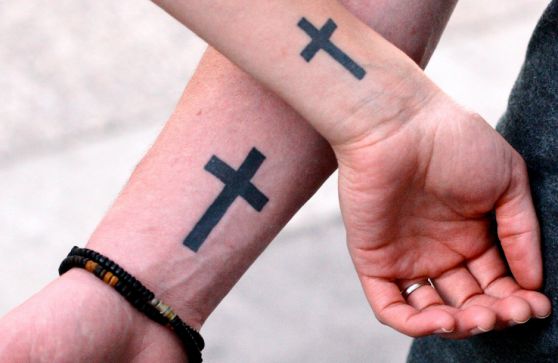Brendan Prout
August 20, 2018
So, the Bible does speak to this. But not in the way most people think.
They usually cite Leviticus 19:28 and 1 Kings 18:28 as prohibitions to the practice, and say that Christians should not have ink, that it’s a sin.
But that’s not the whole counsel of God on the matter. And Christians: listen up! We are instructed to take into consideration the whole counsel of God on any matter. Not just the verse we find convenient, to try to bend the Bible to make it say what we want it to say.
And it has some things to say about tattoos.
For example:
Fact: Jesus has tattoos.
Also fact: Jesus is without sin.
And He has tattoos.
So... obviously it’s then NOT a sin – REPEAT – NOT A SIN - to have tattoos.
Let’s talk about this for a moment, first considering the original section of law where the “prohibition” against tattoos stems from.
The main section of Old Testament law that people point to as a prohibition of tattoos isn’t actually even specific about tattoos. Interestingly enough, the term used in Leviticus 19:28 for the prohibition, “kĕthobeth,” means “perhaps a tattoo.” Perhaps. It might refer to a tattoo. It also refers to any marking on the skin, such as henna or simple writing.
So if we were sticking by that prohibition, without taking into consideration anything else in the Bible, all those kindergartners drawing on their skin would be in terrible sin.
The other term in that prohibition that actually is specific is “seret” which refers directly to cutting into the skin to make scars. That’s not the same word used for tattoo.
Now, taking into consideration the whole counsel of God on the matter...
We're told in Isaiah 49:16 that The Lord has our names tattooed on the palms of his hands. The Hebrew word “chaqaq” used there means "inscribed, embossed, cut in, written, carved into..." and when used in relation to skin, it is the specific term used for tattoo. Not perhaps. Definite.
The Greek synonymous term “grapho” is used in Greek in Revelation 19:16 where it says on Jesus' thigh is tattooed "King of Kings and Lord of Lords". It means “to engrave, to cut in, to permanently mark”. What sort of writing on skin do we know of that matches that definition? Yes. Tattoo.
Let’s talk history for a moment. The prohibition against tattoos in ancient Israel was for two reasons:
1) ancient near east cults performed ancestral worship through tattooing and intentionally scarring themselves, similar to Maori, Congo and Shinto religions today, and Hebrews were to be set apart and different from those religions, not bearing their marks on their skin.
2) Tattoos were reserved for royalty.
So here’s some post Resurrection context for all believers in Jesus. That is all Christians. Listen up.
Christ followers are adopted into Jesus’ family as co-heirs to the kingdom, as God's sons and daughters, and thus we are royalty in the most royal family, now princes and princesses, and since we are now royalty, that particular prohibition is lifted.
Also... Since Jesus fulfilled the full penalty of the law, the former prohibition against tattoos as being representative of ancestor worship has also passed away, not to mention that true Christ followers do not practice ancestor worship, so we are exempt from that prohibition as well.
If it were ever actually a Biblical prohibition against tattoos specifically to begin with, which is highly debatable, since the scholars who translated it from Hebrew into English weren’t sure what kĕthobeth meant, only that it might possibly have referred to tattoos. But it might not have. The meaning of that particular ancient Hebrew phrase is unclear, as it appears in the Bible only once, and never again in any other writings.
Anytime the Bible is unclear on something, we can exercise scholarly methods to determine what God was trying to say there, and again – take into consideration the whole counsel of God on the matter. What does the rest of the Bible say about it?
Well, if Isaiah 49:16 and Revelation 19:16 aren’t clear enough that God Himself is good with having ink, there's also Revelation 22:4, which tells us that all believers will all receive a tattoo on their foreheads: Jesus' name. Whoa. That may be a news flash for some believers. I guess while I'm at it, now is as good a time as any to tell you that Jesus is also going to give you a new name at the same time. May be an identity crisis for some people.
So whether you want ink on your skin in this temporary life or not, it's a fact that each believer has the freedom to do so with a clear conscience, and is going to have at least one tattoo for eternity, the name above all names, right on our foreheads, and our Savior has tats too, so you’d better start getting used to the idea now.
We always need to take into consideration the whole counsel of God on a matter such as this, especially where something can be represented to be a sin, but if our sinless Savior participates in the practice, and if we are destined to join Him in the practice, it is obviously not a sin.
1 Corinthians 10:31 - whether you eat or drink or whatever you do, do all to the glory of God.
It's possible to eat a burrito with thankfulness of heart and give Glory to God. It's also possible to eat a burrito with gluttony and be in complete sin. Tattoos fall in the same category. Do it to give glory to God and it’s game on for tattoos.
Just choose your ink wisely, since Lord willing, you’ll be living with it for awhile.

 RSS Feed
RSS Feed
